- Home
- Barbara Ehrenreich
Nickel and Dimed: On (Not) Getting by in America
Nickel and Dimed: On (Not) Getting by in America Read online
Praise for Nickel and Dimed
“A brilliant on-the-job report from the dark side of the boom. No one since H. L. Mencken has assailed the smug rhetoric of prosperity with such scalpel-like precision and ferocious wit.”
—Mike Davis, author of Ecology of Fear
“Eloquent . . . This book illuminates the invisible army that scrubs floors, waits tables, and straightens the racks at discount stores.”
—Sandy Block, USA Today
“Courageous . . . Nickel and Dimed is a superb and frightening look into the lives of hardworking Americans . . . [that] policy makers should be forced to read.”
—Tamara Straus, San Francisco Chronicle
“I was absolutely knocked out by Barbara Ehrenreich’s remarkable odyssey. She has accomplished what no contemporary writer has even attempted—to be that ‘nobody’ who barely subsists on her essential labors. Not only is it must reading but it’s mesmeric. Bravo!”
—Studs Terkel, author of Working
“Nickel and Dimed opens a window into the daily lives of the invisible workforce that fuels the service economy, and endows the men and women who populate it with the honor that is often lacking on the job. And it forces the reader to realize that all the good-news talk about welfare reform masks a harsher reality.”
—Katherine Newman, The Washington Post
“With grace and wit, Ehrenreich discovers the irony of being ‘nickel and dimed’ during unprecedented prosperity. . . . Living wages, she elegantly shows, might erase the shame that comes from our dependence ‘on the underpaid labor of others.’”
—Eileen Boris, The Boston Globe
“It is not difficult to endorse Nickel and Dimed as a book that everyone who reads—yes everyone—ought to read for enjoyment, for consciousness-raising and as a call to action.”
—Steve Weinberg, Chicago Tribune
“Unflinching, superb . . . Nickel and Dimed is an important book that should be read by anyone who has been lulled into middle-class complacency.”
—Vivien Labaton, Ms.
“Brief but intense . . . Nickel and Dimed is an accessible yet relentless look at the lives of the American underclass.”
—David Ulin, Los Angeles Times
“Unforgettable . . . Nickel and Dimed is one of those rare books that will provoke both outrage and self-reflection. No one who reads this book will be able to resist its power to make them see the world in a new way.”
—Mitchell Duneier, author of Sidewalk
“Observant, opinionated, and always lively . . . What makes Nickel and Dimed such an important book is how viscerally Ehrenreich demonstrates that the method of calculating the poverty threshold is ludicrously obsolete.”
—Laura Miller, Salon.com
“In Nickel and Dimed, Ehrenreich expertly peels away the layers of self-denial, self-interest, and self-protection that separate the rich from the poor, the served from the servers, the housed from the homeless. This brave and frank book is ultimately a challenge to create a less divided society.”
—Naomi Klein, author of No Logo
“Piercing social criticism backed by first-rate reporting . . . Ehrenreich captures not only the tribulations of finding and performing low-wage work, but the humiliations as well.”
—Eric Wieffering, Minneapolis Star Tribune
“Barbara Ehrenreich’s new book is absolutely riveting—it is terrific storytelling, filled with fury and delicious humor and, repeatedly, these stunning moments of the purest empathy with those who toil beside her.”
—Jonathan Kozol, author of Ordinary Resurrections
“Engaging . . . Hopefully, Nickel and Dimed will expand public awareness of the real-world survival struggles that many faced even before the current economic downturn.”
—Steve Early, The Nation
“Ehrenreich’s account is unforgettable—heart-wrenching, infuriating, funny, smart, and empowering. . . . Nickel and Dimed is vintage Ehrenreich and will surely take its place among the classics of underground reportage.”
—Juliet Schor, author of The Overworked American
“Compulsively readable . . . Ehrenreich proves, devastatingly, that jobs are not enough; that the minimum wage is an offensive joke; and that making a salary is not the same thing as making a living, as making a real life.”
—Alex Ohlin, The Texas Observer
“Ehrenreich writes with clarity, wit, and frankness. . . . Nickel and Dimed is one of the most important books to be published this year, a new entry in the tradition of reporting on poverty that includes George Orwell’s The Road to Wigan Pier and Michael Harrington’s The Other America. . . . Someone should read this book to George W. Bush.”
—Chancey Mabe, Ft. Lauderdale Sun-Sentinel
Nickel and Dimed
ALSO BY BARBARA EHRENREICH
This Land Is Their Land: Reports from a Divided Nation
Dancing in the Streets: A History of Collective Joy
Bait and Switch: The (Futile) Pursuit of the American Dream
Blood Rites: Origins and History of the Passions of War
The Snarling Citizen
Kipper’s Game
The Worst Years of Our Lives: Irreverent Notes from a Decade of Greed
Fear of Falling: The Inner Life of the Middle Class
The Hearts of Men: American Dreams and the Flight from Commitment
Global Woman: Nannies, Maids, and Sex Workers in the New Economy
(with Arlie Russell Hochschild)
Re-making Love: The Feminization of Sex
(with Elizabeth Hess and Gloria Jacobs)
For Her Own Good: 150 Years of the Experts’ Advice to Women
(with Deirdre English)
Witches, Midwives, and Nurses: A History of Women Healers
(with Deirdre English)
Complaints and Disorders: The Sexual Politics of Sickness
(with Deirdre English)
The Mean Season: The Attack on the Welfare State
(with Fred Block, Richard A. Cloward, and Frances Fox Piven)
Nickel
— and —
Dimed
ON (NOT) GETTING
BY IN AMERICA
Barbara Ehrenreich
A Holt Paperback
Metropolitan Books • Henry Holt and Company
New York
Holt Paperbacks
Henry Holt and Company, LLC
Publishers since 1866
175 Fifth Avenue
New York, New York 10010
www.henryholt.com
A Holt Paperback® and ® are registered trademarks
of Henry Holt and Company, LLC.
Copyright © 2001 by Barbara Ehrenreich
Afterword © 2008 by Barbara Ehrenreich
All rights reserved.
Distributed in Canada by H. B. Fenn and Company Ltd.
Library of Congress Cataloging-in-Publication Data
Ehrenreich, Barbara.
Nickel and Dimed : on (not) getting by in America / Barbara Ehrenreich.
p. cm.
ISBN-13: 978-0-8050-8838-0
ISBN-10: 0-8050-8838-5
1. Minimum wage—United States. 2. Unskilled labor—United States. 3. Poverty—United States. I. Title.
HD4918.E375 2001
305.569'092—dc21
00-052514
[B]
Henry Holt books are available for special promotions
and premiums. For details contact: Director, Special Markets.
Originally published in hardcover in 2001 by Metropolitan Books
First Holt Paperbacks Edition 2002
D
esigned by Kelly S. Too
Printed in the United States of America
1 3 5 7 9 10 8 6 4 2
contents
Introduction: Getting Ready
one. Serving in Florida
two. Scrubbing in Maine
three. Selling in Minnesota
Evaluation
Afterword: Nickel and Dimed
A Reader’s Guide
Nickel and Dimed
Introduction: Getting Ready
The idea that led to this book arose in comparatively sumptuous circumstances. Lewis Lapham, the editor of Harper’s, had taken me out for a $30 lunch at some understated French country-style place to discuss future articles I might write for his magazine. I had the salmon and field greens, I think, and was pitching him some ideas having to do with pop culture when the conversation drifted to one of my more familiar themes—poverty. How does anyone live on the wages available to the unskilled? How, in particular, we wondered, were the roughly four million women about to be booted into the labor market by welfare reform going to make it on $6 or $7 an hour? Then I said something that I have since had many opportunities to regret: “Someone ought to do the old-fashioned kind of journalism—you know, go out there and try it for themselves.” I meant someone much younger than myself, some hungry neophyte journalist with time on her hands. But Lapham got this crazy-looking half smile on his face and ended life as I knew it, for long stretches at least, with the single word “You.”
The last time anyone had urged me to forsake my normal life for a run-of-the-mill low-paid job had been in the seventies, when dozens, perhaps hundreds, of sixties radicals started going into the factories to “proletarianize” themselves and organize the working class in the process. Not this girl. I felt sorry for the parents who had paid college tuition for these blue-collar wannabes and sorry, too, for the people they intended to uplift. In my own family, the low-wage way of life had never been many degrees of separation away; it was close enough, in any case, to make me treasure the gloriously autonomous, if not always well-paid, writing life. My sister has been through one low-paid job after another—phone company business rep, factory worker, receptionist—constantly struggling against what she calls “the hopelessness of being a wage slave.” My husband and companion of seventeen years was a $4.50-an-hour warehouse worker when I fell in with him, escaping eventually and with huge relief to become an organizer for the Teamsters. My father had been a copper miner; uncles and grandfathers worked in the mines or for the Union Pacific. So to me, sitting at a desk all day was not only a privilege but a duty: something I owed to all those people in my life, living and dead, who’d had so much more to say than anyone ever got to hear.
Adding to my misgivings, certain family members kept reminding me unhelpfully that I could do this project, after a fashion, without ever leaving my study. I could just pay myself a typical entry-level wage for eight hours a day, charge myself for room and board plus some plausible expenses like gas, and total up the numbers after a month. With the prevailing wages running at $6–$7 an hour in my town and rents at $400 a month or more, the numbers might, it seemed to me, just barely work out all right. But if the question was whether a single mother leaving welfare could survive without government assistance in the form of food stamps, Medicaid, and housing and child care subsidies, the answer was well known before I ever left the comforts of home. According to the National Coalition for the Homeless, in 1998—the year I started this project—it took, on average nationwide, an hourly wage of $8.89 to afford a one-bedroom apartment, and the Preamble Center for Public Policy was estimating that the odds against a typical welfare recipient’s landing a job at such a “living wage” were about 97 to 1. Why should I bother to confirm these unpleasant facts? As the time when I could no longer avoid the assignment approached, I began to feel a little like the elderly man I once knew who used a calculator to balance his checkbook and then went back and checked the results by redoing each sum by hand.
In the end, the only way to overcome my hesitation was by thinking of myself as a scientist, which is, in fact, what I was educated to be. I have a Ph.D. in biology, and I didn’t get it by sitting at a desk and fiddling with numbers. In that line of business, you can think all you want, but sooner or later you have to get to the bench and plunge into the everyday chaos of nature, where surprises lurk in the most mundane measurements. Maybe when I got into the project, I would discover some hidden economies in the world of the low-wage worker. After all, if almost 30 percent of the workforce toils for $8 an hour or less, as the Washington-based Economic Policy Institute reported in 1998, they may have found some tricks as yet unknown to me. Maybe I would even be able to detect in myself the bracing psychological effects of getting out of the house, as promised by the wonks who brought us welfare reform. Or, on the other hand, maybe there would be unexpected costs—physical, financial, emotional—to throw off all my calculations. The only way to find out was to get out there and get my hands dirty.
In the spirit of science, I first decided on certain rules and parameters. Rule one, obviously enough, was that I could not, in my search for jobs, fall back on any skills derived from my education or usual work—not that there were a lot of want ads for essayists anyway. Two, I had to take the highest-paying job that was offered me and do my best to hold it; no Marxist rants or sneaking off to read novels in the ladies’ room. Three, I had to take the cheapest accommodations I could find, at least the cheapest that offered an acceptable level of safety and privacy, though my standards in this regard were hazy and, as it turned out, prone to deterioration over time.
I tried to stick to these rules, but in the course of the project, all of them were bent or broken at some time. In Key West, for example, where I began this project in the late spring of 1998, I once promoted myself to an interviewer for a waitressing job by telling her I could greet European tourists with the appropriate Bonjour or Guten Tag, but this was the only case in which I drew on any remnant of my actual education. In Minneapolis, my final destination, where I lived in the early summer of 2000, I broke another rule by failing to take the best-paying job that was offered, and you will have to judge my reasons for doing so yourself. And finally, toward the very end, I did break down and rant—stealthily, though, and never within hearing of management.
There was also the problem of how to present myself to potential employers and, in particular, how to explain my dismal lack of relevant job experience. The truth, or at least a drastically stripped-down version thereof, seemed easiest: I described myself to interviewers as a divorced homemaker reentering the workforce after many years, which is true as far as it goes. Sometimes, though not always, I would throw in a few housecleaning jobs, citing as references former housemates and a friend in Key West whom I have at least helped with after-dinner cleanups now and then. Job application forms also want to know about education, and here I figured the Ph.D. would be no help at all, might even lead employers to suspect that I was an alcoholic washout or worse. So I confined myself to three years of college, listing my real-life alma mater. No one ever questioned my background, as it turned out, and only one employer out of several dozen bothered to check my references. When, on one occasion, an exceptionally chatty interviewer asked about hobbies, I said “writing” and she seemed to find nothing strange about this, although the job she was offering could have been performed perfectly well by an illiterate.
Finally, I set some reassuring limits to whatever tribulations I might have to endure. First, I would always have a car. In Key West I drove my own; in other cities I used Rent-A-Wrecks, which I paid for with a credit card rather than my earnings. Yes, I could have walked more or limited myself to jobs accessible by public transportation. I just figured that a story about waiting for buses would not be very interesting to read. Second, I ruled out homelessness as an option. The idea was to spend a month in each setting and see whether I could find a job and earn, in that time, the money to pay a second month’s rent. If I was payin
g rent by the week and ran out of money I would simply declare the project at an end; no shelters or sleeping in cars for me. Furthermore, I had no intention of going hungry. If things ever got to the point where the next meal was in question, I promised myself as the time to begin the “experiment” approached, I would dig out my ATM card and cheat.
So this is not a story of some death-defying “undercover” adventure. Almost anyone could do what I did—look for jobs, work those jobs, try to make ends meet. In fact, millions of Americans do it every day, and with a lot less fanfare and dithering.
I am, of course, very different from the people who normally fill America’s least attractive jobs, and in ways that both helped and limited me. Most obviously, I was only visiting a world that others inhabit full-time, often for most of their lives. With all the real-life assets I’ve built up in middle age—bank account, IRA, health insurance, multiroom home—waiting indulgently in the background, there was no way I was going to “experience poverty” or find out how it “really feels” to be a long-term low-wage worker. My aim here was much more straightforward and objective—just to see whether I could match income to expenses, as the truly poor attempt to do every day. Besides, I’ve had enough unchosen encounters with poverty in my lifetime to know it’s not a place you would want to visit for touristic purposes; it just smells too much like fear.
Unlike many low-wage workers, I have the further advantages of being white and a native English speaker. I don’t think this affected my chances of getting a job, given the willingness of employers to hire almost anyone in the tight labor market of 1998 to 2000, but it almost certainly affected the kinds of jobs I was offered. In Key West, I originally sought what I assumed would be a relatively easy job in hotel housekeeping and found myself steered instead into waitressing, no doubt because of my ethnicity and my English skills. As it happened, waitressing didn’t provide much of a financial advantage over housekeeping, at least not in the low-tip off-season when I worked in Key West. But the experience did help determine my choice of other localities in which to live and work. I ruled out places like New York and L.A., for example, where the working class consists mainly of people of color and a white woman with unaccented English seeking entry-level jobs might only look desperate or weird.

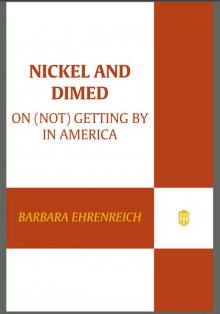 Nickel and Dimed: On (Not) Getting by in America
Nickel and Dimed: On (Not) Getting by in America Living With a Wild God
Living With a Wild God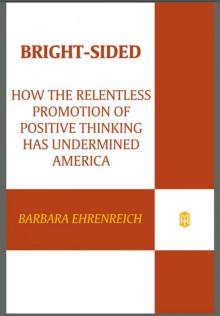 Bright-Sided
Bright-Sided Bait and Switch: The (Futile) Pursuit of the American Dream
Bait and Switch: The (Futile) Pursuit of the American Dream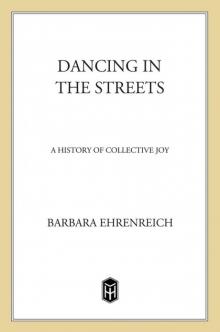 Dancing in the Streets: A History of Collective Joy
Dancing in the Streets: A History of Collective Joy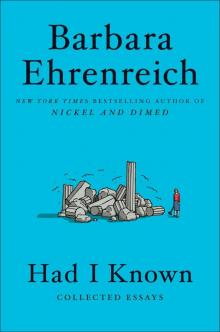 Had I Known
Had I Known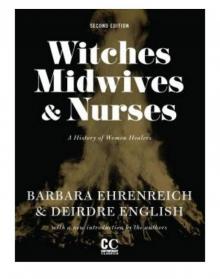 Witches, Midwives, and Nurses
Witches, Midwives, and Nurses For Her Own Good: Two Centuries of the Experts Advice to Women
For Her Own Good: Two Centuries of the Experts Advice to Women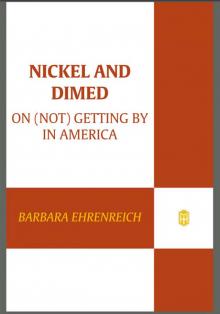 Nickel and Dimed
Nickel and Dimed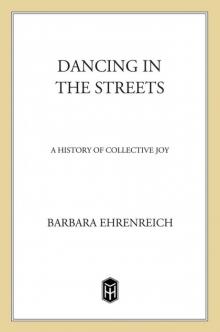 Dancing in the Streets
Dancing in the Streets Bait and Switch
Bait and Switch